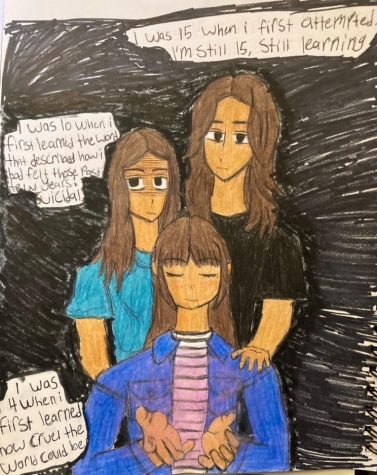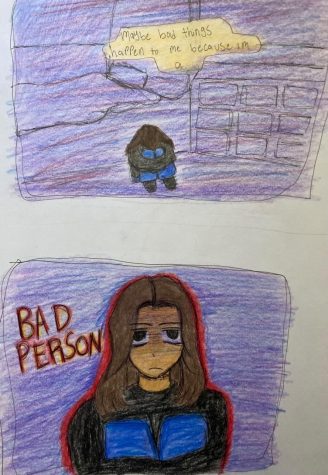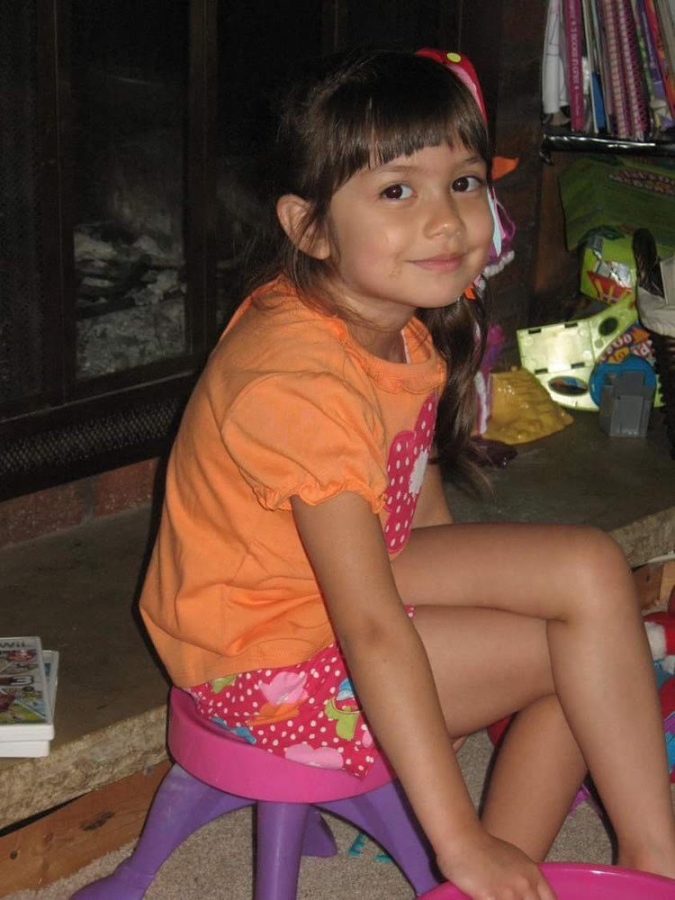Genesis Reyes, 10, when she was in elementary school. She has lived with C-PTSD even from that young age.
My Box Of Polaroids: C-PTSD
Genesis Reyes, 10, gives insight onto what it is like to live with C-PTSD.
Complex-Post Traumatic Stress Disorder, or C-PTSD, sounds a lot like PTSD. But, C-PTSD actually spans across more diverse symptoms and behaviors and consists of many traumatic events accumulated over time.
“It’s C-PTSD, meaning that it’s complex. Which means that in order to have C-PTSD, it was either multiple events [that caused it], or it was a super long time in a single event,” said Genesis Reyes, 10, who was medically diagnosed with C-PTSD in October.
Yet, Genesis claims that she had known she had C-PTSD for a long time, and the diagnosis from the UIHC confirmed it after overdosing.
There are many symptoms that PTSD and C-PTSD do share. These can include intrusive thoughts, memories, flashbacks or nightmares, avoiding anything that is a reminder of a trauma, changes in thought and mood patterns, and a heightened sense of paranoia and alertness.
Outside the realm of these shared symptoms are negative self-image, psychosis, relationship problems (platonically and romantically), memory problems, and difficulty regulating emotions, which fall under the category of C-PTSD (ChoosingTherapy).
“With PTSD, you have a sense of threats and you tend to avoid certain people, places, and things, and there are the flashbacks. With C-PTSD, you get a lot of those, but you can also get a lot of broken self-identity. Often, it includes stuff like disassociation, a negative self-concept, and an altered sense of either yourself or people,” said Reyes.
Psychosis is a condition in which people disassociate from the world and their bodies. People who are familiar with psychosis also have a fragmented connection with reality, actions, and themselves (NHS).
“I feel incredibly disconnected to my own actions. Yesterday, let’s say I read a book. But it won’t actually feel like I read that book because it’ll just feel like someone else completely,” said Reyes.
Psychosis and lapse in memory go hand-in-hand with C-PTSD. Memory problems can consist of forgetting traumatic events that have happened, how it was caused, where, and why. For example, Genesis knew she had some sort of traumatic event happen to her when she was four, but she can’t remember what it was. Therefore, understanding it becomes extremely difficult.
“Because I don’t remember it, I can’t safely say for certain if it happened or if it didn’t…” said Reyes, “Now I’m, what, fifteen, and I’m still trying to go through my empty box of memories and sort them all out. My [identity] is incredibly fragmented because of this. Think of a box of very old polaroids, and then you splatter them all out on the table, and you’re just trying to put bits and pieces together. You’re trying to figure out, what date was this? When was this? How old was I? Who was I then? What was I like? And you’re just looking at this table and you don’t know a lot of it.”
Delusions and hallucinations are also common symptoms of C-PTSD. When someone experiences these epidsodes, they can either not discern what is real, or their brain creates fake scenarios. If someone can’t tell what is real or not, it makes the episodes even more frightening.

“I remember I would have these really, really bad delusions that people were going to start coming after me. This summer, I had some of the worst ones yet. I had a delusion that my mom was going to kill me,” said Reyes.
These episodes can be extremely painful, and aren’t always the same. It can be overwhelming not knowing to expect when going into an episode.
“Episodes can feel, to me, that someone is ripping at my chest and pulling it apart and my organs are all spilling out,” said Reyes,“Walking felt like being a zombie. The entire world didn’t exist except for myself. When traumatic things happen to me, it’s like I’m in a simulation or a video game that I can’t reset.”
Psychosis, memory problems, and hallucinations are just some of the symptoms that people with C-PTSD can experience. With these symptoms all stacked on each other, it can be draining, especially if someone has been experiencing them since a young age.
“I don’t know what it’s like to grow up. I grew up at the age of, what, four? That was when I first understood how bad things could get. Because of that, I never had a proper childhood,” said Reyes.

These emotions and events became a part of Genesis. While they have shaped her current self, she also feels different because of them. Not everyone experiences these things, and growing up with them makes her feel different from everyone.
“I don’t often connect with other people. Like, I have friend groups, obviously, but I don’t connect to them, because I’ve spent my entire life by myself in my own room, with my own trauma. I don’t understand other people and how they go about their daily lives and I [would rather not], because I’ve lived my entire life my certain way,” said Reyes.
Living differently and disconnected from peers can make life hard. It can make feeling alone your best safe space. No matter who reaches out, how would they understand?
“It feels like there’s no point in me being super close to [my friends] because I’m my own self. Because of this trauma, my brain operates in a way that I don’t need other people. I’ve lived my entire life by myself with this trauma, and I can be fine without the help of other people,” said Genesis.
Being officially diagnosed changed Genesis’s life.
“It’s weird, being diagnosed, because I’m seeing a lot of people trying to help me, and it feels wrong because others now know this. Other people can now see what’s happening and what’s in my brain,” said Reyes,“It’s a really long process, and I don’t think I’m ever going to be [perfectly] normal again, and that’s simply the way it is. As long as I heal and recover from at least a little bit, [from] how I was when I was ten, [or] when I was four, then that is enough.”

